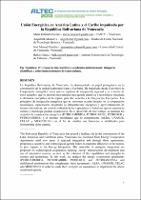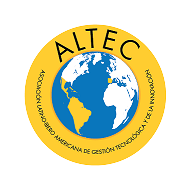Unión Energética en América Latina y el Caribe impulsada por la Republica Bolivariana de Venezuela

View/
Date
2013Author
Cáceres, María Gabriela
Monsalve, Angiebelk
Martínez, José Manuel
García, Belkis
Metadata
Show full item recordAbstract
La Republica Bolivariana de Venezuela, ha desempeñado un papel protagónico en la construcción de la unidad Latinoamericana y Caribeña. Ha impulsado desde Convenios de Cooperación Energética hasta nuevos espacios de integración regional y es a través de estos acuerdos, que se propone instrumentar una agenda científica y tecnológica vinculada a eficiencia energética en la región, para dar sustento a la Integración Energética. Los principios de integración energética que se proponen estarán basados en la cooperación tecnológica, capacitación, desarrollo de infraestructura energética y aprovechamiento de fuentes alternativas, así como la cohesión de las capacidades y fortalezas que en materia de ciencia y tecnología puedan desarrollarse. En el desarrollo de este trabajo, se analizan los acuerdos de cooperación energética (PETROAMÉRICA, PETROCARIBE, PETROSUR y PETROANDINA) y el entorno multilateral que lo complementa (ALBA, UNASUR, CELAC y MERCOSUR) con el fin de estudiar sus fortalezas o debilidades para instrumentar dicha agenda. The Bolivarian Republic of Venezuela, has played a leading role in the construction of the
Latin American and Caribbean unity. Venezuela has promoted from Energy Cooperation
Agreements until new areas of regional integration and through these agreements, proposing a scientific and technological agenda linked to energetic efficiency in the region, to give support to the Energy Integration. The principles of energetic integration are
proposed on technological cooperation, training, energy infrastructure development and
use of alternative sources, as well as the cohesion of the capabilities and strengths in
science and technology. In this work, we analyze the energy cooperation agreements
(PETROAMERICA, PETROCARIBE, PETROSUR and PETROANDINA) and
multilateral environment that complement these agreements (ALBA, UNASUR, CELAC
and MERCOSUr) in order to study their strengths or weaknesses to implement the above
mentioned agenda.

